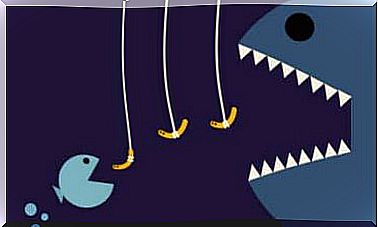Damocles Syndrome

Very often, figures from history or mythology are used to name and explain psychological experiences. For example, the story of Damocles is used to explain how a person who has overcome a very serious and difficult illness can be consumed with fear of its reappearance. Thus, we speak of Damocles syndrome when there is an inordinate fear of relapse of a disease.
This syndrome is seen mostly in cancer patients (cancer patients). In these cases, it is normal to fear a relapse and the fear is completely founded. However, when this uncertainty or fear of relapse becomes too intense and affects the daily life of individuals, we are referring to Damocles syndrome. We are then in a situation where preoccupation and fear have become pathological. In this article, we will tell you what Damocles Syndrome is and show you how to deal with it.
Why is the fear of relapse of a disease called Damocles syndrome?
The pathological fear and uncertainty associated with relapsing a disease is called Damocles syndrome for a specific reason. According to the story, Damocles was a courtier at the Court of Dionysius. One day, the latter, annoyed at being constantly watched, decided to exchange his place at the table with Damocles.
During the banquet, Damocles looked above him. He realized that a sword was hanging over him and that it was held only by a very fine thread. Aware of the reality, Damocles was unable to take advantage of the banquet. He only thought about the moment when the sword would fall on him.

The same thing actually happens in cancer patients. After overcoming the disease, they develop irrational fears associated with relapse. In addition, these fears increase as the time for routine exams draw closer. In fact, the person feels that the phantom of the disease can become real again at any time. Because of him, normalcy as well as everything that has been won could disappear.
Why does Damocles syndrome appear?
Damocles syndrome appears as the result of a vital experience that connects the individual with a very intense fear. He also feels a low tolerance for the uncertainty that all human beings experience. The situation of out of control that exists in the face of a relapse of a disease such as cancer is also very difficult to bear.
All these aspects are responsible for the fact that by surviving an important disease we can develop such a syndrome. The latter can also accompany the patient throughout his life. And the worst part is that even if the medical checks are positive, the fear may not go away. The person may come to think that the controls are not working and that they are not detecting the relapse.
On the other hand, those who survive childhood cancer have a high chance of developing this syndrome. Although the survival rate for cancer has reached a threshold of 60% to 80% according to a study by the Mayo Medical School (Cupit-Link, Syrjala & Hashmi, 2018), the diagnosis of cancer is still linked to people with the most primitive fears.
Beyond the fear of death, we fear pain and the loss of “normalcy”. Thus, any signal that could presage a return to the worst is experienced as something very shocking and threatening.
How to act in the face of Damocles syndrome?
First of all, it is important to follow the medical indications given by the responsible specialist. Also, although this is not their intention, those around them usually end up compounding the fears with their opinion and experiences.
Also, you have to experience the emotions, communicate them and accept them. People who have survived these kinds of before and after situations in their lives may benefit from joining a therapy or support group. In these groups, we learn to manage emotions in a more appropriate way.
The work with the family of the ex-cancer patient is fundamental. As published in the Journal of Cancer Education (2010), working with the patient’s family is a key aspect in overcoming Damocles syndrome. Indeed, the family represents a context that can intensify or allay the fear of relapse.

On the other hand, the person can reinforce certain skills allowing him to live in the present and to manage his concerns in anticipation. Because the fear of relapse feeds on information: there is a high probability of relapse. The problem arises when this probability swells. Or when the anticipation begins to seriously limit a person’s daily life.
Finally, as with other syndromes or psychological experiences, it is easier to overcome Damocles syndrome with the help of a professional. Therapy groups as well as specialized psychological attention are a fundamental tool in managing the fear of a possible relapse.










